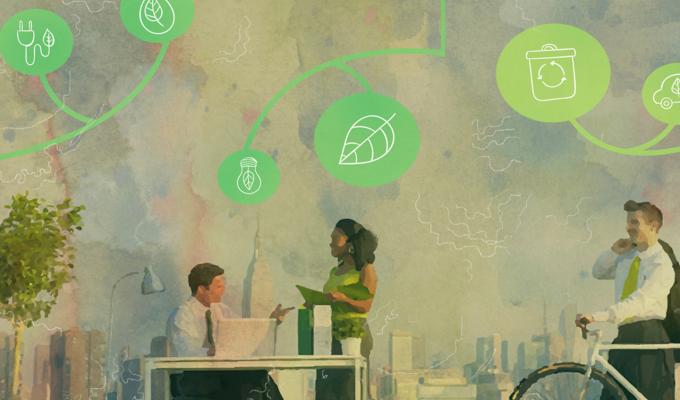Maintaining a hegemonic position in the market is as much as an illusion now than ever. 88% of the 500 most valuable companies listed by the magazine Fortune in 1955 have now disappeared. This figure indicates that in order for a company to survive, it needs to constantly innovate and reinvent itself. Companies need to adapt to the new global markets where there is competition from all sides, and the limits between sectors have faded.
A clear example of the importance of being an agile, responsible and creative organization is the Apollo XIII Space Mission. As we know, the mission failed as it was unable to land due to the potentially fatal explosion of an oxygen tank. Their plans radically changed because of this accident, and their mission was to then rescue themselves and get their battered space ship back to Earth safe and sound.
The explosion changed the rules of the game, just as globalization has changed the rules of the market. Companies have had to become more agile, responsive, responsible and innovative within the different departments or structures of their organizations, this is now referred to as intrapreneurship. In the case mentioned, the mission was to get to the moon, the accident (markets, competition) changed that plan and it became a race for survival, which was achieved by team work, agility, responsibility and creativity: “Creating the required products and services by any means possible to meet the consumer’s needs.”
Lessons learned
According to Rita McGrath, from Columbia University in New York, companies now need to change their way of thinking:
- Tradicionalmente las compañías se centraban en tener ventajas competitivas monolíticas, ahora las ventajas están sujetas a una gran presión.
- Traditionally, companies focused on having monolithic competitive advantages, now the advantages are subject to a lot of pressure.
- Companies used to maintain their existing perspectives, now companies constantly question the status quo.
- Companies that had similar profiles used to define their processes and strategies, they should now consider other players to participate in their strategies.
- Processes that were slow but precise (financial statements, forecasts). Companies should now be agile, quick and be looking for certainty, but not necessarily precision.
- Companies used to be focused on forecasting, now they are motivated by the discovery of new markets and new clients, focusing on a better understanding of the customer.
- Companies just used to focus on the net present value (NVP), they now iterate before making money. Companies now have to practice, shape their product and spend on prototypes, even though money will not be made until they develop the best possible product.
- Business of the past used to look for confirmation, today they look for “disconfirmation”: “Show me where I am going wrong, that this is not the right market”, they have the opportunity to constantly question themselves.
- They used to be focused on an internal authority, they now look to aggressively focus on the rest of the world.
- If a product failed in the market, companies used to settle for failure. They now need to get themselves back up, brush themselves off and keep on going.
- Instead of restructuring companies, today they morph talent into a corresponding functional area to change performance.
- Companies used to have to determine facts, they now respond to early warnings. A different way of observation and awareness is needed.
- Innovation used to be done in waves, it now needs to be constant and oblique, it needs to run through the veins of companies.
- Failure did not used to be discussed, companies now have it as part of their culture, there has to be constant questioning and a pro-failure culture.
- Current companies need to have a meaning and their employees should reflect that meaning, helping to generate thought, constant creativity and acting quickly to respond to the needs of the market.
- Companies need to take accountability when identifying with something, they need to take hold of its value, and take charge of the problem or solution. This is the case with disruptive companies, that are changing the outlook of the market.
The Sharing Economy, the new way of doing business
What does a sharing economy mean? According to Jeremiah Owyang, the market does not just belong to a few companies, the market is everybody’s and we participate as both consumers and suppliers of products and services. Sharing is becoming more powerful than these companies. What will happen when people no longer need to buy from these companies? Many businesses are giving a deaf ear to this, and they believe that they can maintain themselves, but the prominence of companies is radically changing.
In order to remain profitable, companies need to partake in the sharing economy. In this internet age, we can share our likes and dislikes on social media, but we can also use them as platforms to do business. We can use social media to obtain products and services from our friends, we no longer have to buy exclusively from these companies.
Faced with this change, the first reaction of large companies was to run an aggressive marketing campaign to try and influence a change on public policies, regulations, security, unions and quality control etc. Other companies saw it as an opportunity to share what was theirs and their access with other corporations, new companies and the community. This was nothing new, but the use of technology changed the rules. You can now travel in Uber or Lyft, stay in Airbnb or GuestToGuest, ask for an online loan in online communities such as Kiva, share office space in Liquid Space, etc.
The fundamentals of the sharing economy
Mark Zuckerberg understood the new sharing economy (new industries, new markets, new consumers); and thanks to this the growth of Facebook has been immense in the last couple of years.
The impact of sharing can be hard. What would happen if people just started sharing one car instead of each buying their own? The large car manufactures would begin to get scared … The generational changes are pointing towards a generation that prioritizes experiences over possessions, they have a preference to not get into debt and have access to products instead of owning them.
There are also economic factors: there are idle assets that are business opportunities. While the population grows, the earth’s resources remain the same, and there is the potential to reuse or resell products that have been manufactured for others. In fact, venture capitalists have already been investing in the sharing economy (2 billion dollars were invested in startups in 2015).
How to get into this new market?
The secret is to change the way in which we think: products become services, services become new markets, and new markets create new products.
Nowadays, you need to generate a platform to not just sell your product, but to add an extra value to your consumer. That means that your product does not become a necessity, but the platform you create becomes a necessity, so that people consume your product along with other products. In other words, your product becomes a service thus generating a virtuous cycle. Companies such as Netflix or SalesForce create events or offer prizes and experiences along with their subscription. Toyota and Audi are allowing people to pay to rent their cars.
Michael Dubin is the creator of the Dollar Shave Club, which is a platform that offers a high-quality safety razor for a monthly subscription of one dollar. He changed the business model of razor blades. In 2012, the company generated 250 million dollars’ worth of sales, and last year it was acquired by Unilever. What he thought up was not anything particularly disruptive, but he was thinking about the sharing economy.
The sharing economy contributes to the generation of new markets, it motivates company directors to see their business as a service, to accompany their consumers on their way, so that they, themselves, develop the market. For example, the consumer may tell them how they should change their product. However, what motivates the market?
Owyang gives us an interesting example: “Nacho”, a young man of 35, had a house and he discovered a new opportunity in the market by using his guestroom that he had published on AirBnB. What would happen if apart from just renting out the guestroom, there was a business opportunity for something else? That is when he thought to team up with an international hotel chain to offer a truly first-class experience.
Companies as sharing platforms
We have to extend and innovate our boundaries of sharing: co-finance, co-think, co-create, co-design, co-build, co-sell, co-invest, co-market etc. Your platform is a business that gives on so many levels, but ensures that you do not do business on your own.
A good example is #Wikispeed Car, a community in which every car-part expert sends their products to an assembly center and they manage to produce a car for just 25,000 dollars. Carrot 3D, innovators in the 3D printing business, their sales have jumped in the last two years due to their quick productivity. That is co-creation.
Steven Holtzan from Inifity Pharmaceuticals, used the sharing economy to give more power to his employees, in what is called “citizen ownership”. Every employee is responsible for the work, and when it is done well they then gain access to the company. They are each owners of a part of the company, and are consequently more motivated (this is also an example of the sharing economy).
The challenge is how to create a sharing platform, how to share with other people and companies. Flexible companies should have the knowledge and skills to detect new opportunities, they should have the speed to respond when faced with uncertainty and volatility, and they should also have the capability to trust in one another, now more than ever.
What can you do differently? In which areas? What new skills do you need to develop? What motivates you? The company is a platform for new markets, it is a platform to resolve and detect problems and opportunities, so that we can take charge of them. We need to innovate to stay relevant.
Companies are asking themselves what is next? How can they adapt to new markets, trends and challenges? Well, they are on the right track.




